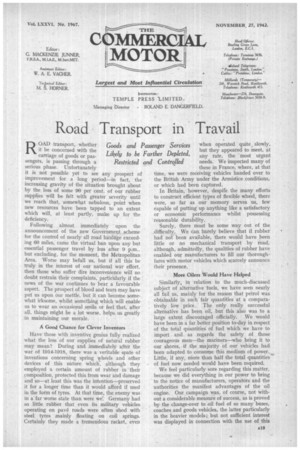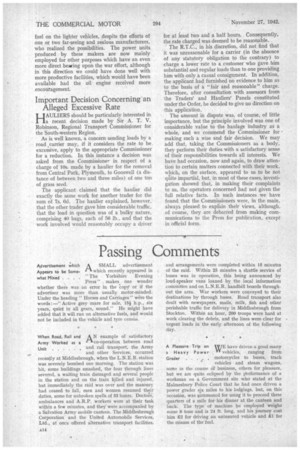Road Transport in Travail
Page 15

Page 16

If you've noticed an error in this article please click here to report it so we can fix it.
ROAD transport, whether it be concerned with the carriage of goods or passengers, is passing through a serious phase. Unfortunately it is not possible yet to see any prospect of improvement for a long period—in fact, the increasing gravity of the situation brought about by the loss of some 90 per cent. of our rubber supplies will be felt with greater severity until we reach that, somewhat nebulous, point when new resources have been tapped to an extent which will, at least partly, make up for the deficiency.
Following almost immediately upon the announcement of the new Government scheme for the control of nearly all road haulage exceeding 60 miles, came the virtual ban upon any but essential passenger travel by bus after 9 p.m., but excluding, for the moment, the Metropolitan Area. Worse may befall us, but if all this be truly in the interest of our national war effort, then those who suffer dire inconvenience will no doubt restrain their complaints, particUlarly if the news of the war continues to bear a favourable aspect. The prospect of blood and tears may have put us upon our mettle, but it can become somewhat irksome, whilst something which will enable us to wear an occasional smile or feel that, after all, things might be a lot worse, helps us greatly .-in maintaining our morale.
A Good Chance for Clever Inventors Have those with inventive genius fully realized what the loss. of our supplies of natural rubber may mean? During and immediately after the war of 1914-1918, there was a veritable spate of inventions concerning spring wheels and other devices of this nature whicli, although they employed a certain amount of rubber in their composition, protected this from wear and damage and so—at least this was the intention—preserved it for a longer time than it would afford if used in the form of tyres. At that time, the, enemy was in a' far worse state than were we Germany had so little rubber that even its military vehicles operating on pave roads were often shod with steel tyres mainly .floating on coil springs. Certainly they made a tremendous racket, even when operated quite, slowly, but they appeared to meet, at any rate, the most urgent needs. We inspected many of these in France, where, at that time, we were receiving vehicles handed over to the British Army under the Armistice conditions, or which had been captured.
In Britain, however, despite the many efforts to construct efficient types of flexible wheel, there were, so far as our memory serves us, few capable of putting up anything like a satisfactory or economic performance whilst possessing • reasonable durability.
Surely, there must be some way out of the difficulty.. We can, barely believe that if rubber had not been available, there would have been little or no mechanical transport by road, although, admittedly, the qualities of rubber have enabled our manufacturers to fill our thoroughfares with motor vehicles which scarcely announce their presence.
More Oilers Would Have Helped • Similarly, in relation to the much-discussed subject of alternative fuels, we have seen nearly all fail us, mainly for the reason that petrol was obtainable in such fair quantities at a comparatively low price. The only really successful alternative has been oil, but this also was to a large extent discouraged officially. We would have been in a far better position to-day in respect of the total quantities of fuel which we have to import and as regards the safety of those courageous men—the mariners—who bring it to our shores, if the majority of our vehicles had been adapted to consume this medium of power.„ Little, if any, More than half the total quantities of fuel now needed would have been required, We feel particularly sore regarding this matter, because we did everything in our power to bring to the notice of manufacturers, operators and the authorities the manifest advantages of the oil engine. Our campaign was, of course, not without a considerable measure of success, as is proved by the change-over to oil fuel of so many buses, coaches and goods vehicles, the latter particularly in the heavier models; but not sufficient interest was displayed in connection with the use of this fuel on the lighter vehicles, despite the efforts of one or two far-seeing and zealous manufacturers, who realized the possibilities. The power units produced by these makers are now mainly employed for other purposes which have an even more direct bearing upon the war effort, although in this direction we could have done well with more productive facilities, which would have been • available had the oil engine received more encouragement.
Important Decision Concerning an Alleged Excessive Rate
HAULIERS should be particularly interested in a recent decision made by Sir A. T. V. Robinson, Regional Transport Commissioner for the South-western Region.
As is well known, a concern sending loads by a road .carrier may, if it considers the rate to be. excessive, apply to the appropriate Commissioner for a reduction. In this instance a decision was asked from the Commissioner in respect of a charge of 10s. made by a haulier for the removal from Central Park, Plymouth, to Gooswell (a distance of between two and three miles) of one ton of grass seed.
The applicant claimed that the haulier did exactly the same work for another trader for the sum of 7s. 6d. The haulier explained, however, that the other trader gave him considerable traffic, that the load in question was of a bulky nature, comprising 40 bags, each of 56 lb., and that the work involved would reasonably occupy a driver for at least two and a half hours. Consequently, the rate charged was deemed to be reasonable. The R.T.C., in his discretion, did not find that it was unreasonable for a carrier (in the absence of any statutory obligation to the contrary) to charge a lower rate to a customer who gave him substantial and regular loads than to one providing him with only a casual consignment. In addition, the applicant had furnished no eVidence to him as to the basis of a "fair and reasonable" charge. Therefore, after consultation with assessors from the Traders' and Hauliers' Panels constituted under the Order, he decided to give no direction on this application.
The amount in dispute was, of course, of little importance, but the principle involved was one of considerable value to the haulage 'industry as a whole, and we commend the Commissioner for making such a wise and fair decision. We may add that, taking the Commissioners as a body, they perform their duties with a satisfactory sense of their responsibilities towards all interests. We have had occasion, now and again, to draw attention to certain matters connected with their work, which, on the surface, appeared to us to be not quite impartial, but, in most of these cases, investigation showed that, in making their complaints to us, the operators concerned had not given the full relative facts. In such instances we have found that the Commissioners were, in the main, always pleased to exprain their views, although, of course, they are debarred from making communications to the Press for publication, except in official form.




















































